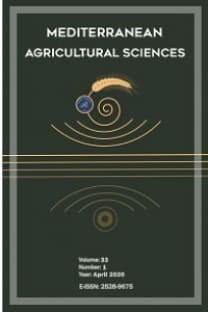Tuz stresinin patateste stoma dayanıklılığı ile ilgili Asg1 geni ifade düzeyine etkileri
Patates, Tuz stresi, İn vitro, Asg1 geni, Gen ekspresyonu
The effects of salt stress on expression of Asg1 gene related stomatal resistance in potato
Potato, Salt stress, In vitro, Asg1 gene, Gene expression,
___
- Batelli G, Massarelli I, Van Oosten M, Nurcato R, Vannini C, Raimondi G, Leone A, Zhu JK, Maggio A, Grillo S (2012) Asg1 is a stress-inducible gene which increases stomatal resistance in salt stressed potato. J Plant Physiol 169 (18): 1849-57.
- Çulha Ş, Çakırlar H (2011) Tuzluluğun bitkiler üzerine etkileri ve tuz tolerans mekanizmaları. AKÜ FEBİD 11: 11-34.
- Hoth S, Morgante M, Sanchez JP, Hanafey MK, Tingey SV, Chua NH (2002) Genome-wide gene expressionprofiling in Arabidopsis thaliana reveals new targets of abscisic acid and largely impaired gene regulation in the abi1-1 mutant. Journal of Cell Science, 115(24): 4891–4900.
- Karanlık S (2001) Değişik buğday genotiplerinde tuz stresine dayanıklılık ve dayanıklılığın fizyolojik nedenlerinin araştırılması. Doktora Tezi, Çukurova Üniversitesi Fen Bilimleri Enstitüsü, Adana.
- Kreps JA, Wu Y, Chang HS, Zhu T, Wang X, Harper JF (2002) Transcriptome changes for Arabidopsis in response to salt, osmotic, and cold stress. PlantPhysiology, 130(4): 2129–2141.
- Maas EV (1984) Crop tolerance. California Agric 38(10): 20-21.
- Munns R, Tester M (2008) Mechanisms of salinity tolerance, Annual Review of Plant Biology 59: 651-681.
- Murashige T, Skoog F (1962) A revised medium for rapid growth and bio assays with tobacco tissue cultures, Physiol. Plant., 15: 473-497.
- Nakashima K, Ito Y, Yamaguchi-Shinozaki K (2009) Transcriptional regulatory networks in response to abiotic stresses in arabidopsis and grasses. Plant Physiol 149: 88–95.
- Raghavendra AS, Gonugunta VK, Christmann A, Grill E (2010) ABA perception and signalling. Trends Plant Sci 15: 395–401.
- Ruggiero B, Koiwa H, Manabe Y, Quist TM, Inan G, Saccardo F (2004) Uncoupling the effects of abscisic acid on plant growth and water relations. Analysis of sto1/nced3, an abscisic acid-deficient but salt stress-tolerant mutant in arabidopsis. Plant Physiol 136: 3134–3147.
- Sahi C, Singh A, Blumwald E, Grover A (2006) Beyond osmolytes and transporters: novel plant salt-stress tolerance-related genes from transcriptional profiling data. Physiologia Plantarum, 127(1): 1–9.
- Seki M, Kamei A, Yamaguchi-Shinozaki K, Shinozaki K (2003) Molecular Responses to drought, salinity and frost: common and different paths for plant protection. Current Opinion in Biotechnology 14: 194-199.
- Shen Q, Chen CN, Brands A, Pan SM, Tuan-Hua DH (2001) The stress- and abscisic acid-induced barley gene HVA22: developmental regulation and homologues in diverse organisms. Plant Molecular Biology 45(3): 327–340.
- Shimazaki T, Endo T, Kasuga M, Yamaguchi-Shinozaki K, Watanabe KN, Kikuchi A (2016) Evaluation of the yield of abiotic-stress-tolerant AtDREB1A transgenic potato under saline conditions in advance of field trials. Breeding Sci 66: 703–710.
- Tuteja N (2007) Mechanisms of high salinitytolerance in plants. Methods in Enzymology 428: 419-438.
- Uno Y, Furihata T, Abe H, Yoshida R, Shinozaki K, Yamaguchi-Shinozaki K (2000) Arabidopsis basicleucinezipper transcription factors in volved in an abscisicacid-dependent signal transduction pathway under droughtandhigh-salinityconditions. Proceedings of the National Academy of Sciences of the United States of America, 97(21): 11632–11637.
- Wang H, Miyazaki S, Kawai K, Deyholos M, Galbraith DW, Bohnert HJ (2003) Temporal progression of gene expression responses to salt shock in maize roots. Plant Mol Biol 52: 873–891.
- Xiong L, Zhu JK (2003) Regulation of abscisic acid biosynthesis. Plant Physiol 133: 29–36.
- Yamaguchi-Shinozaki K, Shinozaki K (2006) Transcriptional regulatory networks in cellular responses and tolerance to dehydration and cold stresses. Annu Rev Plant Biol.; 57: 781–803.
- Yaşar F (2003) Tuz stresi altındaki patlıcan genotiplerinde bazı antioksidant enzim aktivitelerinin in vitro ve in vivo olarak incelenmesi. Doktora Tezi, Yüzüncü Yıl Üniversitesi Fen Bilimleri, Van.
- Zhang H, Han B, Wang T, Chen S (2012) Mechanisms of plant salt response: ınsights from proteomics. Journal of Proteome Research 11: 49-67.
- Zhu JK (2002) Salt and drought stress signal transductıon in plants. Annual Review of Plant Biology 53: 247-73.
- Zou C, Sun K, Mackaluso JD, Seddon AE, Jin R, Thomashow MF (2011) Cis-regulatory code of stress-responsive transcription in Arabidopsis thaliana. Proc Natl Acad Sci USA 108: 14992–14997.
- Yayın Aralığı: Yılda 3 Sayı
- Başlangıç: 1988
- Yayıncı: Akdeniz Üniversitesi
Antalya ili tarım işletmelerinin tarımsal yapı, üretim ve mekanizasyon özelliklerinin belirlenmesi
Yeşil alanların kent turizmine katkısının Antalya örneğinde incelenmesi
Tuz stresinin patateste stoma dayanıklılığı ile ilgili Asg1 geni ifade düzeyine etkileri
Serkan URANBEY, Deniz KÖM, Güray AKDOĞAN, Hussein Abdullah Ahmed AHMED, Nilüfer KOÇAK, Muharrem Erdi KARA
Farklı atık materyallerin Matthiola incana 'Iron Rose' yetiştiriciliğine etkisi
Gülbin ÇETİNKALE DEMİRKAN, Hülya AKAT, Bülent YAĞMUR
Azotlu gübre dozlarının İtalyan çimi (Lolium italicum L.) çeşitlerinin ot kalitesine etkisi
Türkiye’de toprak parçalanması ve miras hukuku
Cengiz SAYIN, Mehmet ALTUNKAYA, Yavuz TAŞÇIOĞLU, Oya SAV, İpek KAVASOĞLU
Nazan ÇÖMLEKCİOĞLU, Semra ARIKAN
Solanum melongena ve Solanum torvum’un türler arası melezlerinin morfolojik özellikleri
